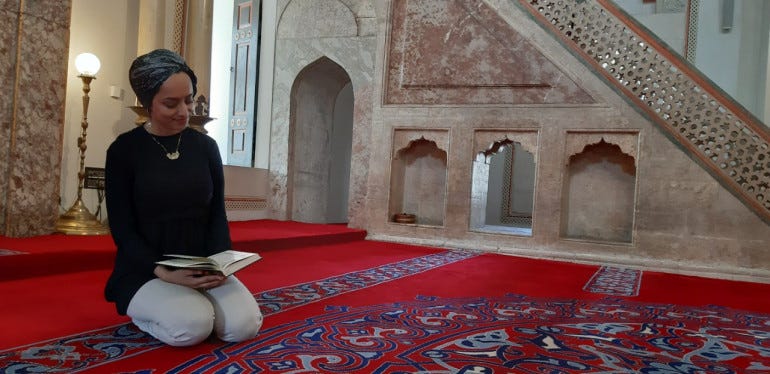Global Roundup: Muslim Women Protect the Environment, Quran #FemaleReciters Campaign, Trans Women Arrest in Cameroon, Women in China vs Online Misogyny, Lebanese Illustrator Celebrates Women for Eid
Compiled by Samiha Hossain
National and regional leaders of 'Aisyiyah's environmental chapter stand between trees the group planted in Sukoharjo, Central Java province, Indonesia on May 5, 2021. Thomson Reuters Foundation/Harry Jacques
We are creative women. We are not rich, but we have solutions. We bring the Hadith (teachings of the prophet Muhammad) to explain why the impact of climate change is important. – Hening Purwati Parlan, national head of 'Aisyiyah's environment wing, the LLHPB
In 2015, 'Aisyiyah's leadership set up its LLHPB environment wing to increase women's capacity to respond to climate change and natural disasters. They also run a “Green Ramadan” program, which hosts evening talks to discuss how families can reduce waste and the use of plastics during the Islamic fasting month.
It is explained in the Koran that it is important to do good in the month of Ramadan. Protecting our ecosystem and environment is one of these good things. – Rahma Susanti, head of the LLHPB in West Kalimantan province
“Eco-jihad” is a term that resonates with many of the Muslim women. It reminds them that protecting the environment is part of their faith and damage done now will have a future impact.
Jihad is an Arabic word that literally means striving or struggling, especially with a praiseworthy aim. So eco-jihad means striving to protect our ecosystem. – Hening a former journalist who now works as an environmental consultant
'Aisyiyah is involved in a variety of environmental work including wildfire prevention efforts and plans to plant 5 million fruit trees in homes and gardens, partly to boost food security during the COVID-19 pandemic. It is uplifting to see women of faith come together to fight an important cause. It is also worth remembering that throughout the world, women and other marginalized people continue to put in this labour, while large corporations and those in power continue to harm the environment.
------------------------------------------------------------------------------------------------------
Madinah Javed recites the Quran at a mosque [Courtesy of Madinah Javed]
Muslims call a skilled reciter of their holy book, the Quran, a quari (for men) or a quari’ah (for women). It can take decades of practice to master proper recitation and pronunciation. Madinah Javed, 25, law graduate and activist from Scotland, began her journey of becoming a quari’ah from a young age. In 2017, she was invited to recite a part of the Quran and share the story of Mary and Jesus as a guest at St Mary’s Cathedral in Glasgow. When Javed posted her proud accomplishment online, she was met with a huge backlash from the far-right all over the world.
For months, she received hate messages and threats to the point of wanting to disappear and change her name. The Muslim community was silent, as women are usually shunned in many communities in the United Kingdom when they recite the Quran publicly. However, many Muslim women also wrote to Javed saying they were inspired, as it was the first time in their lives they heard a woman recite the Quran in public.
Though women reciting the Quran is common and normalized in many Muslim-majority-countries, some Muslim communities in the West believe women cannot recite for audiences that include men. Javed became inspired to start the #FemaleReciters campaign that year, aiming to encourage Muslim girls and women to share their recitations online, to raise awareness and help revive the sacred tradition of Quran recitation. Today, the hashtag leads to a collection of Quran recitations by women and girls around the world on various social media platforms.
So my activism with Female Reciters began to rehabilitate female Quran recitation. And this beautiful community of female reciters began online so naturally and my vision was that it would be a place for all women to share and belong in order to revive our sacred tradition together as sisters. – Madinah Javed
Javed’s movement has led to many different initiatives. Last month, the website Amaliah compiled a playlist of recitations by women worldwide reciting “The Cave”, a special chapter from the Quran that is recommended for Muslims to recite every Friday. Javed knows that change takes time, so she visits different countries to speak to people and raise awareness. You can hear a #FemaleReciter via this link.
------------------------------------------------------------------------------------------------------
Shakiro, a popular social media figure, was one of the women imprisoned for convictions including ‘public indecency’. Photograph: Shakiro237/Facebook/via Reuters
As part of Cameroon’s growing campaign against sexual minorities, two transgender women have been convicted of “attempting homosexuality” and sentenced to five years in prison. One of the women is trans celebrity Shakiro, a YouTuber who highlights the problems Cameroon's banned LGBT community faces. She and her friend Patricia have been in detention since February after their arrest at a restaurant, targeted for the way they dressed according to their lawyers. Their charges include public indecency and non-possession of a national ID card, an offence rarely prosecuted in the country.
The impact is that a clear message is being sent to the LGBT+ community that they are not welcome in Cameroon. It’s for them to know that if you happen to be arrested you could be imprisoned for five years. – Richard Tamfu, a lawyer for the women
This sentence is particularly harsh, especially given that no evidence was provided by the court of the same sex-acts for which the two women were convicted. Shakiro and Patricia are being targeted with threats and attempted sexual abuse since their arrest, so an appeal was submitted earlier this week.
Before 2013, Cameroonian authorities were among the most aggressive in the world for prosecuting same-sex acts. After years of prosecutions falling significantly, there has been a surge in the past year of reported incidents, said Neela Ghoshal, LGBT rights director at Human Rights Watch. According to Ghoshal, between February and April there were at least 24 incidents where Cameroonian security forces arbitrarily arrested, beat or threatened people for alleged consensual same-sex conduct or gender nonconformity.
The treatment of the LGBTQ+ community in Cameroon is incredibly concerning. It is imperative that we show solidarity to them.
------------------------------------------------------------------------------------------------------
Last month, a group of feminists in China covered a hill in the desert with over 1,000 banners containing abusive messages women received on social media, creating an “internet violence museum.” Most of these messages were received following weeks of tense discussion surrounding how women using platforms such as Weibo are treated, after a woman, Xiao Meili, posted a video of a man throwing a hot liquid at her when she asked him to stop smoking.
We wanted to make the trolling words into something that could be seen, touched, to materialise the trolling comments and to amplify the abuse of what happens to people online. – Yaqing, an artist involved in the project (not her real name)
Women have been using social media to bring attention to issues such as human rights violations in Xinjiang, but this has led to abuse and harassment, with people online doxxing them, threatening them and their families, doctoring nude photographs with their appearance and accusing them of being traitors and separatists.
Chinese Australian researcher Vicky Xu, was harassed after reporting with colleagues from the Australian Strategic Policy Institute on more than 80 international brands that utilize forced labor, including in China. She became trending on Weibo and was accused of endangering other Chinese Australians, fake nude photos of her spread on social media, and her family and friends were questioned and detained.
Before this saga, I think few on Weibo spent much time thinking about Uyghurs or forced labour. I’m receiving this much hate because people were feeling righteous – imagine if they had access to more information about the plight of Uyghurs. – Vicky Xu
Women are subjected to alarming rates of misogyny and violence online. This campaign by Chinese feminists is a powerful way for them to reclaim the narrative and make it clear that the abuse and harassment will not work to silence them.
------------------------------------------------------------------------------------------------------
Nourie Flayhan has teamed up with Carolina Herrera to create three images that reflect the spirit of Eid Al Fitr. Courtesy Carolina Herrera
To celebrate Eid Al Fitr, marking the end of the month of Ramadan during which Muslims fast, Lebanese illustrator Nourie Flayhan has created a series of drawings to celebrate women and emphasize the bonds of female friendship and family.
Flayhan switched to drawing after initially studying textiles, which can be seen in her distinctive style. She often uses figures with many eyes and always fills her pieces with patterning of some sort. For her three Eid Al Fitr drawings, she used many colours as well as elements from traditional Islamic architecture to set the tone such as the crescent moon in the background. Two of the drawings feature a pair of friends or sisters leaning into each other, while the third image has women's hands, clutching colourful lanterns.
Nourie Flayhan is very successful having worked with brands such as Gucci, Selfridges and Yoox. This Eid has been particularly difficult for Muslims with the COVID-19 pandemic and the serious injustices communities around the world are facing. Flayhan has created beautiful art that is reminiscent of the parts of the celebration that people cherish – family and love.
——————————————————————————————
Samiha Hossain (she/her) is a student at the University of Ottawa. She has experience working with survivors of sexual violence in her community, as well as conducting research on gender-based violence. A lot of her time is spent learning about and critically engaging with intersectional feminism, transformative justice and disability justice.
Samiha firmly believes in the power of connecting with people and listening to their stories to create solidarity and heal as a community. She refuses to let anyone thwart her imagination when it comes to envisioning a radically different future full of care webs, nurturance and collective liberation.










